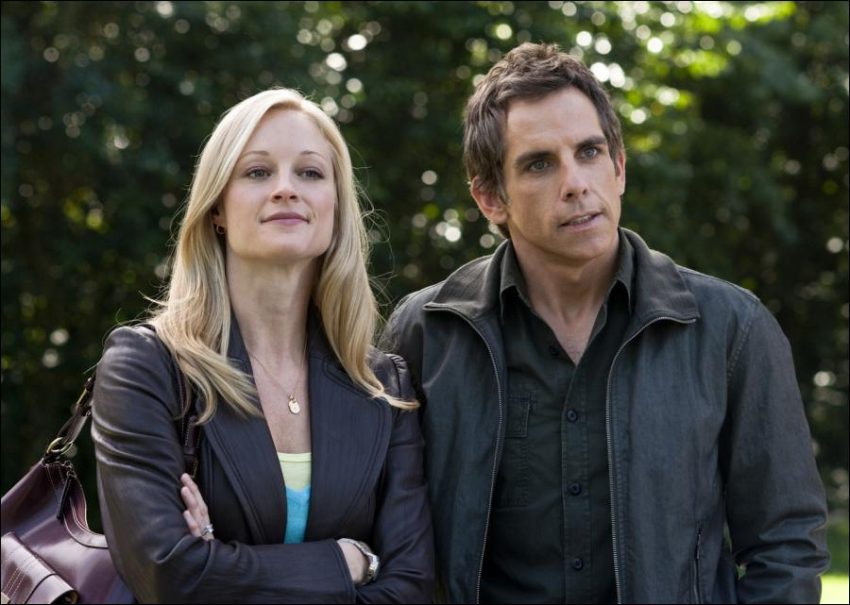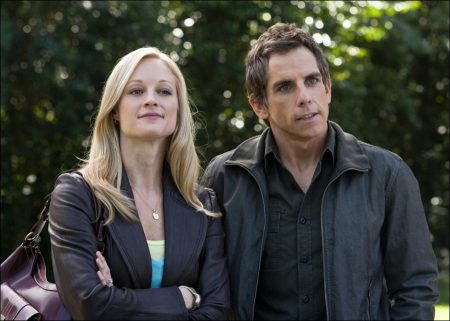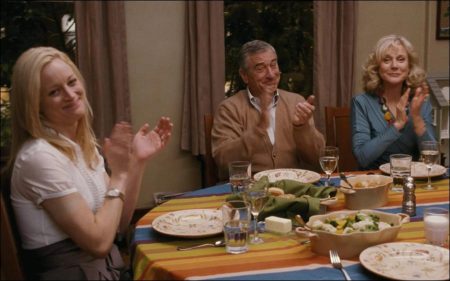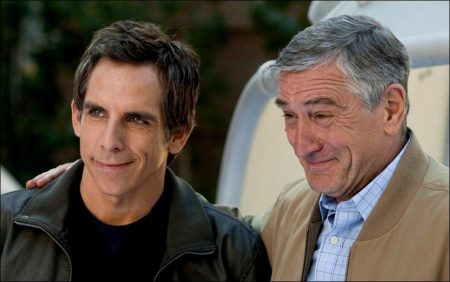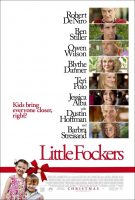Taglines: Maybe kids will bring them closer?
The test of wills between Jack Byrnes (Robert De Niro) and Greg Focker (Ben Stiller) escalates to new heights of comedy in the third installment of the blockbuster series — Little Fockers. Laura Dern, Jessica Alba and Harvey Keitel join the returning all-star cast for a new chapter of the worldwide hit franchise. It has taken 10 years, two little Fockers with wife Pam (Teri Polo) and countless hurdles for Greg to finally get “in” with his tightly wound father-in-law, Jack. However, after the cash-strapped dad takes a job moonlighting for a drug company with a sexy co-worker, Jack’s suspicions come roaring back.
It couldn’t be a worse time for Greg, who is simultaneously juggling the demands of impressing the headmistress (Laura Dern) of a prestigious private school for the twins and finessing his shady general contractor (Harvey Keitel) — whose repeated renovation delays on their dream home threaten to derail the kids’ birthday party — all while fending off the advances of the drop-dead gorgeous pharmaceutical rep (Jessica Alba) with whom Greg works.
As the Focker-Byrnes clan—Greg’s parents, Bernie (Dustin Hoffman) and Roz (Barbra Streisand), Jack and Dina (Blythe Danner)—and Pam’s lovelorn ex, Kevin (Owen Wilson), descend for the birthday bash, Greg must prove to the skeptical Jack that he’s fully capable as the man of the house and designated Godfocker of the clan. But with all the misunderstandings, spying and covert missions, will Greg pass Jack’s final test and become the family’s next patriarch… or will the circle of trust be broken for good?
Little Fockers (known as Meet the Parents: Little Fockers in the United Kingdom and Southeast Asia) is a 2010 American comedy film and sequel to Meet the Parents (2000) and Meet the Fockers (2004). It stars Robert De Niro, Ben Stiller, Owen Wilson, Blythe Danner, Teri Polo, Jessica Alba, Dustin Hoffman and Barbra Streisand. The first film in the series not to be directed by Jay Roach; it is instead directed by Paul Weitz with Roach as one of the producers. It is also the first film not to be distributed by DreamWorks Pictures in non-US countries, with Paramount Pictures taking over. Likewise, Stephen Trask, a relative newcomer, takes over composing duties from veteran Randy Newman. The film was a box office success, grossing over $310 million worldwide.
First Comes Love
As Meet the Fockers closed with a radiantly pregnant Pam marrying Greg in front of their loved ones, the next chapter in the blockbuster series was nimbly established. If raising children was to be the crux of a new Parents sequel, this chapter would need to bring us back to focus on the relationships of the Byrnes and the Fockers—both romantic and familial.
For series producer Jane Rosenthal, the film title may have fallen into place with ease, but fleshing out an original story that would excite audiences would prove to be a bigger challenge for her team. “Little Fockers and Meet the Fockers are not traditional sequels,” cites the veteran filmmaker and partner with Robert De Niro at Tribeca Productions. “Each film ends up chronicling the growth of these characters — whether it’s Pam and Greg’s tentative steps as a committed couple, meeting her parents or the introduction of both sets of future in-laws. The one thing about this franchise that makes the comedy work so well is the dynamic between the characters. With each film, the audience is more vested in these relationships. The audience has grown with the franchise, so we always aim to be at the top of our game.”
The key to any successful chapter is a lively, entertaining take on characters the audience has come to love. With back-to-back blockbusters behind them, the filmmakers once again turned to the screenwriter who most intimately knows the Focker-Byrnes history. John Hamburg, who previously co-wrote the screenplays for both Meet the Parents and Meet the Fockers and also serves as a producer on Little Fockers, returns with his combination of original story lines and broad comedic sensibility that solidify the circle of trust.
For Hamburg, the beauty of the previous films lay in the simplicity of the premise: boy meets girl, boy meets girl’s parents, boy’s parents meet girl’s parents. But he would find his biggest challenge was trying to sustain the relatability that propelled the first two comedies. As much as Hamburg looked forward to revisiting the characters he’d helped to create 10 years earlier, it turned out that the working title the team had embraced would present a whole new set of challenges.
Aiding Hamburg in navigating the new trials and tribulations of the Fockers and the Byrnes was Larry Stuckey. An associate producer on Meet the Fockers, Stuckey’s writing partnership with franchise director/producer Jay Roach, coupled with his own experiences as an anxious new father and husband, helped inspire this chapter for the two screenwriters.
Roach, who previously directed and produced both Meet the Parents and Meet the Fockers, admits that the process of finding another chapter was a lengthy one. “It took a few years to come up with a story that we thought earned its way back in,” the producer notes. “We wanted to make sure that our audience would buy into the set of conditions that would pit Greg Focker against Jack Byrnes again. I’m happy that we keep getting invited back.”
When it comes to developing material, Hamburg, who in addition to the Parents series has collaborated with Ben Stiller on Zoolander and Along Came Polly (which Hamburg wrote and directed), has cultivated a shorthand with the multitalented actor.
“When you’re making the third film in a series, the constant question is ‘How do you keep it fresh and retain what people liked about the first two movies?’” he asks. “Ben is a perfectionist and one of the smartest people I’ve ever encountered. He wants to keep working at the material from a character standpoint. So you challenge yourself to make it better, make it real and more original. The voice I have as a writer and the voice that Ben has as an actor just go together well. It’s a very fluid process.”
Stiller knew he was only interested in revisiting his role as Greg Focker if the material lent itself to another story that moved the characters’ lives forward. “We worked on the script to get it to a place that was organic and felt like it made sense for the movie to be happening at this point,” he notes. “It’s dealing with issues that are relevant for each of the characters at various stages in life.”
The concept was reduced to the universal challenges that any couple deals with as they expand upon their family. Wanting the best for your children, keeping your head above water financially, facing your mortality and maintaining a marriage—whether five or 35 years along—are all relatable to the audiences who have embraced the series. More of life’s ups and downs, coupled with meddling in-laws, turned out to be a welcome foundation for the next chapter.
Taking the helm of the third film is director Paul Weitz, whose knack for injecting heart into comedy, whether broad or subtle, has proven to win over audiences in such films as American Pie and About a Boy (which he directed with his brother, Chris), and In Good Company. Says Rosenthal of Weitz joining the fold: “Paul brings a terrific sensibility to Little Fockers. One of the things we were looking for was to take these real situations and push the comedy within the situations. Paul possesses that ability in spades. He’s terrific with actors, and especially with the kids.”
For Weitz, who has shown a predilection for comedy with a strong emotional connection, the Meet the Parents franchise was a good fit—one to which he could bring his own stamp. It also reunited him with two of his producers from About a Boy, Jane Rosenthal and Robert De Niro. Little Fockers gave the director a chance to flex his comedic muscle again and shepherd the Fockers and the Byrnes as Jack passes on the mantle of leadership to Greg.
The director has an interesting take on what brought him to this installment, in which the entire cast agreed to reprise their roles: “I’m drawn to independent film, but I’m also drawn to classic filmmaking of the studio era, and it’s almost impossible to replicate that situation where you have huge stars committed to a project. It’s almost like the studio is saying, ‘We have Clark Gable and Marilyn Monroe, and we’re going to put them in the movie.’ This felt similar to that. It’s such an incredibly unusual situation to have a cast of this caliber in place.”
Weitz particularly appreciated what the script had to say about our decisions to grow up. He offers: “Ben’s character seems like one of those archetypical characters that everybody is able to project their neuroses onto. For Greg, they are feelings of insignificance. The primary thing that made this click was the idea that Greg was at a particular point in his life where you have kids who are old enough that you no longer feel like you’re in some weird dream that you’re going to wake up from. You actually feel like, ‘Wow, I really do have kids.’ You’re next in line and taking responsibility for both the generation before you and the one after.”
With Weitz now a part of the filmmaking team, the fine-tuning of the material continued. A key element to developing the storyline was to maintain the familial relationships while jumpstarting the story. The screenwriters accomplished this by introducing us to the characters at a new juncture in their lives. Namely, Jack and Greg’s contentious relationship, which has propelled the series, would again be a primary focus.
Being unable to choose your family and the baggage that comes along with them is a universal theme. In the two men’s shared history, Greg has set Jack’s backyard ablaze and been administered a lie detector test by Jack. Now, they have finally settled into a semblance of harmony and genuine affection. But as the in-laws navigate life’s latest hurdles, their innate flaws resurface; Jack’s trust issues and Greg’s need to please are back and more comically painful than ever.
Stiller catches us up on where the characters are with one another: “Life events have conspired to send Jack and Greg back to where they started. But, ultimately, they are finally able to put the cards on the table as these subtle tensions come to a head. It all starts to bubble up to the surface.”
The performer’s ability to make Greg Focker relevant after a decade continued to impress the filmmakers. Notes Weitz: “The key thing for any really terrific comedic performance is that the character doesn’t know he or she is in a comedy. Ben is very keen to not play anything for laughs. I don’t think he ever thinks, ‘I’m going to do something funny now.’ I think he thinks, ‘My character is in this situation, and this is what he’d be saying.’ Playing comedy is similar to drama. You must be completely invested in the moment.”
Little Fockers (2010)
Directed by: Paul Weitz
Starring: Robert De Niro, Ben Stiller, Jessica Alba, Teri Polo, Owen Wilson, Barbra Streisand, Laura Dern, Dustin Hoffman, Blythe Danner, Daisy Tahan, Colin Baiocchi, Harvey Keitel, Tom McCarthy
Screenplay by: John Hamburg, Victoria Strouse
Production Design by: William Arnold
Cinematography by: Remi Adefarasin
Film Editing by: Greg Hayden, Leslie Jones, Myron I. Kerstein
Costume Design by: Molly Maginnis
Set Decoration by: David Smith
Art Direction by: Sue Chan
Music by: Stephen Trask
MPAA Rating: PG-13 for mature sexual humor throughout, language and some drug content.
Distributed by: Universal Pictures
Release Date: December 22, 2010
